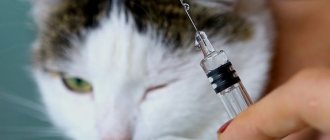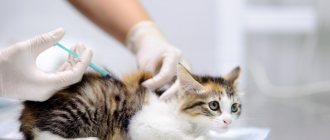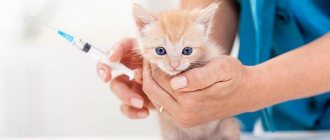Basic kitten vaccination
The most dangerous period for kittens is the period from 6 to 16 weeks, when the immunity inherited from the mother cat gradually disappears, and their own immune system is not yet fully functioning. Therefore, the first vaccination of Sphynx kittens is carried out no earlier than the 6th week of life, but no later than the 16th.
The little sphinx is vaccinated twice with an interval of 3-4 weeks. Next, the pet is vaccinated once a year.
Important! 10 days before vaccination, anthelmintic treatment must be done.
When buying a kitten, you need to make sure that he has received all the necessary vaccinations. If not, then you need to make them. If there are other cats living in the house, then a 10-day quarantine is arranged for the new pet, since after vaccination the kitten is actually a carrier of a weakened virus.
The basic vaccination schedule for a Sphynx kitten is shown in the table.
| Age | Required vaccines |
| 6–8 weeks | from rhinotracheitis (FVR), panleukopenia (FPV), calcivirosis (FCV) |
| 12 weeks | ELISA test (if it turns out to be negative, then they give the leukemia vaccine) + first revaccination FVR, FPV, FCV |
| 16 weeks | against rabies + revaccination against leukemia + second revaccination FVR, FPV, FCV |
| 16 months | FVR, FPV, FCV, leukemia, rabies (and then the same every year) |
What diseases need to be vaccinated against?
There are basic (recommended) vaccines for major diseases and additional ones used by choice or necessity. Vaccination against panleukopenia viruses, herpesvirus (viral rhinotracheitis), calicivirus and rabies is considered basic for all cats (rabies vaccination is mandatory for the Russian Federation).
Additional vaccinations include vaccinations against feline leukemia virus, feline immunodeficiency virus, bordetellosis and feline chlamydia. The choice of necessary vaccines is made depending on the lifestyle of the cat - it is estimated how many animals are kept in the house, whether the pet goes for walks on the street, goes to the country, or is it even a stud cat. Typically, a veterinarian recommends one or another vaccination option after a conversation with the animal owner.
Preparing for vaccination
Preparation is not an empty measure, but a way to prevent complications. Only healthy and developed Sphynx kittens are vaccinated. Vaccination is unacceptable if the pet is malnourished or, conversely, obese. First you need to bring the animal's weight back to normal.
Vaccination is prohibited if the Sphynx is sick, has a cold, coughs, sneezes, or has a fever. The procedure is postponed until the pet recovers. Do not vaccinate a kitten during the period of teeth change.
The vaccine is given to the kitten by a veterinarian. Before the procedure, he checks the physical condition of the animal and performs a stool analysis. If the Sphynx is sick, infected with helminths, then the veterinarian will prescribe treatment.
To carry out anthelmintic treatment before vaccination, use drugs sold in a veterinary pharmacy. The following tools are suitable:
- tablets - “Azinox”, “Drontal”, “Prasitab”;
- liquid – “Profender”, “Advocate”;
- sweets – “Poliverkan”;
- suspension – “Drontal Junior”, “Prasicide”;
- paste - "Dirofen".
Vaccinations for dogs
Timely vaccination of a dog can save not only its health, but also its life. Among dog infections there are extremely dangerous ones that are difficult to tolerate. For some infections, the mortality rate reaches 100%. The only protection against deadly infections is vaccination. Therefore, it is necessary to vaccinate your dog. In addition, by spending some time and money on vaccination, the owner will save himself from possible large expenses in the future, saving on expensive treatment if the disease develops. In order for your dog’s vaccination to be successful and have only a positive effect on the animal’s body, you need to know when to come for the next vaccination and properly prepare your pet for the procedure.
What effect does vaccination have on a dog?
The vaccine helps build immunity in the dog. When vaccinated, the active vaccine material enters the dog's body. This stimulates the animal’s immune system, which remembers and forms a specific response, including producing antibodies. Subsequently, if the pet encounters an invasion of infection, it will not get sick, or the disease will be mild.
What diseases should your dog be vaccinated against?
Mandatory vaccines include the following diseases:
- Rabies: a deadly disease characterized by damage to the brain and spinal cord. Lethal not only for animals, but also for humans. Once the disease begins to manifest itself, cure becomes impossible. The lethality of rabies is 100%. Sick animals often exhibit aggressive behavior or, conversely, unusual affection. The animal cannot eat or drink, swallow saliva, and loses its voice. With the further development of the disease, it dies in terrible agony from severe pain (inflammation of the central nervous system). Rabies vaccination is strictly required!
- Canine plague: Can occur in several forms, which often makes diagnosis difficult. Typically, this disease is manifested by high fever, respiratory symptoms (rhinitis or bronchopneumonia), digestive disorders (gastroenteritis), symptoms of the eyes, skin and nervous system. Often ends in death.
- Canine hepatitis: Symptoms range from a slight increase in body temperature and congestion of the mucous membranes to vomiting, jaundice, an enlarged abdomen, depression, decreased white blood cell levels, pain and severe inflammation in the liver.
- Canine parvovirus enteritis: Parvovirus is highly contagious, affecting the gastrointestinal tract, causing loss of appetite, vomiting, fever and often severe bloody diarrhea. Severe dehydration can develop quickly and can be fatal within 48 to 72 hours.
- Leptospirosis is a disease, the causative agent of which is excreted primarily in the urine of the patient, and affects people and some animals. Symptoms in dogs include fever, vomiting, abdominal pain, diarrhea, loss of appetite, severe weakness and lethargy, stiffness, jaundice, muscle pain, infertility and kidney failure (may be accompanied by liver failure). Recommended vaccines include the following diseases:
- Kennel cough: Dogs become infected through contact with other dogs, such as in dog shelters or at dog shows. The disease causes a severe cough and can be more or less severe depending on the age and general health of the dog.
- There are also vaccines against lichen, trichophytosis, and microsporia.
What vaccines does a dog need?
Talk to your veterinarian and describe your dog's lifestyle and expected locations. For example, are you planning free walks in the forest, at the dacha, in the village, hunting, participation in competitions and exhibitions, trips abroad. Based on the information received, your veterinarian will develop a vaccination program tailored to your dog's living conditions.
When does an adult dog need to be vaccinated?
Dogs over one year of age need annual vaccinations. This will protect the dog from dangerous diseases and maintain immunity throughout its life. The myth that older dogs do not need to be vaccinated is dangerous. Their immunity weakens with age. And if infected, the dog will be especially seriously ill. Therefore, older animals must be vaccinated. But at the same time, it is advisable to properly prepare an older dog for vaccination. The preparatory stage of vaccination depends on the condition of the animal. Our clinic has developed an effective method of preparing older animals for vaccination, taking into account their existing chronic diseases. Don't neglect vaccinations! Be carefull!
Contraindications for dog vaccination
Only healthy animals are vaccinated. Not all animals can undergo routine vaccination. Among the contraindications it should be noted:
- feverish condition;
- acute diseases;
- 14 days before and after surgery;
- severe weakening, exhaustion of the dog’s body (for example, after illness, surgery);
- pregnancy.
There are other contraindications that can and should be discussed with your doctor.
What should the owner do after the animal is vaccinated?
It is very important to follow your veterinarian's recommendations to keep your animal healthy. Treat this responsibly! It is important that your pet is well rested after the injections as his immune system will be working harder than usual. It is necessary to exclude swimming, hypothermia, and changing food. Usually, all animals vaccinated in our clinic easily tolerate this procedure, and satisfied owners come back for subsequent revaccination within a year. Enjoy being with a healthy pet!
Where is the best place to vaccinate your pet: at home or in the clinic?
We accept animals at the clinic. Advantages of vaccination in the clinic: • The doctor has at hand all the necessary equipment and tools for a high-quality examination of the animal and vaccination; • The vaccine is constantly in the required temperature range before its use, as required by the rules for using the drug. The fact is that the vaccine must be stored and moved only under certain conditions. Otherwise, the properties of the vaccine may be lost. • If necessary, any other necessary manipulations can be immediately carried out in a clinical setting. For example, a veterinarian may identify a tick or other problems in a kitten that require immediate attention. Good health to your pet!









